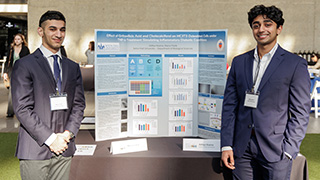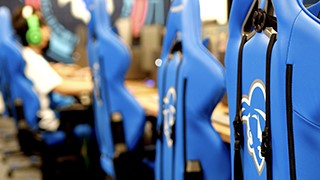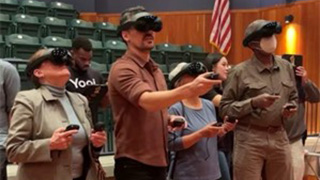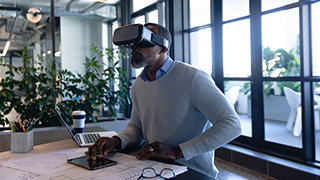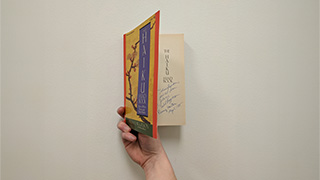Tackling COVID-19 Questions Up to the Minute: Med Students Helping Guide Care
Wednesday, April 1, 2020
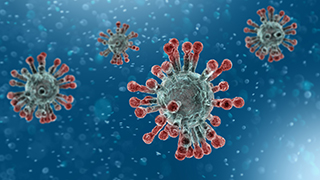
The science data is flooding in, less than three months after this virus was first identified in China. The peer-reviewed medical publications on this topic — in a single week in mid-March — numbered about 400. Hundreds more are popping up online in pre-print servers. But how can a doctor on the "front lines" of this pandemic keep track of this explosion of information?
Enter: a group of medical students at the Hackensack Meridian School of Medicine at Seton Hall University. The handful of students are working to parse through this ballooning literature — and getting timely answers to burning questions to those front-line doctors and nurses throughout the Hackensack Meridian Health network of clinical sites, including 17 hospitals.
"These students, still in the earliest part of their medical career, are already making an impact," said Bonita Stanton, M.D., the founding dean of the medical school. "They are helping in a valuable way at a time of need."
"Every day there are critical new things to know," said Jeffrey Boscamp, M.D., vice dean of the medical school and a professor of pediatrics, and also a veteran infectious disease doctor. "It's explosive and exponential — and these students are helping us keep up."
The venture is an initiative co-led by Christopher Duffy, MLIS, AHIP, the associate dean of the Health Sciences Library at the Interprofessional Health Sciences Campus of which the medical school is part, and Vice Dean Boscamp.
The idea for the initiative came from the HMH pandemic leadership team, Drs. Jerry Zuckerman, Daniel Vargas and Carol Barsky, who reached out to Stanton. The clinical and logistic aspects of their roles did not allow them the time to carefully go through the publications that were appearing so fast, they explained. Their hope was the second-year medical students might have the time to pull together the daily explosion of new news on the pandemic and present it to them in a distilled fashion.
The students had the time available, since their second-year clerkships were interrupted, in the wake of the Association of American Medical Colleges (AAMC) recommendation last week that medical students nationwide end all patient contact for the next two weeks.
The students taking part so far are: Austin Krebs, Katie Veltri, Daniel Menza, Helen Pozdniakova, Kevin Brandecker, Eric Stanton, Candace Pallitto, and Catherine Hahn.
The Interprofessional Health Sciences campus librarians helping to guide them through the thicket of data are Duffy, Allison Piazza and Andy Hickner.
The plan: an elective course in which the students would work through PubMed, as well as the teeming databases of BioRxiv and MedRxiv, which are pre-print servers hosted by Cold Spring Harbor Laboratory, the BMJ, and Yale, looking for the up-to-the-minute latest findings from around the world.
"These are questions that are not easy to answer right away, yet," said Duffy. "The students have really risen to the challenge."
"The students, with the support of Boscamp, Duffy, and their team are finding a way to meaningfully contribute to the health care system," said Stanton.
The students are finding the growing information, distilling it into summaries, and relaying that fast-flowing data into the clinical settings of Hackensack Meridian Health.
The initiative started on March 23, with five pressing questions about critical decision points: masking, disinfection, and prevention, among them.
Within hours, and under deadline, the research made its first impact.
The critical question, needed by mid-afternoon the same day, was to determine the best evidence indicating when it was safe to send patients back to nursing homes after COVID-19 infection.
Austin Krebs, the student assigned the question, cracked the (virtual) books. Within hours, and with assistance from Duffy and Boscamp, Krebs had pulled from nearly a dozen sources. The latest CDC guidelines of isolation and fever monitoring, were complemented by findings that were just days old: the latest findings in how long patients stay positive on PCR test for the virus (from JAMA); the behavior of SARS-CoV2, in terms of viral shedding (the New England Journal of Medicine); the possibility of fecal-to-oral viral transmission (from the Lancet Gastroenterology and Hepatology); and how long mild cases of COVID-19 may still remain infectious (The Lancet Infectious Disease).
Together, they came up with a conservative recommendation to limit potential exposures. And those recommendations reduced risk for everyone. Krebs said he's embraced the new role, even though it wasn't what he was expecting for his second year of medical school.
"I'm finding the task force work extremely satisfying," the medical student said. "All the reading is making me more knowledgeable as far as COVID-19 goes, and knowing that my work has the potential to go directly to clinical teams and impact healthcare is incredible.
"Searching for an answer regarding nursing-home discharges on Monday only emphasized how valuable our contributions can be," Krebs added. "The deadline made everything much more real, and I did my best to comb through the literature (with help, of course) to suitably answer a deceptively simple question in a timely manner."
The more we know about the virus, the more we need to know — and the students will be able to help, even if they're not gowned and masked, right in the clinical setting, added the vice dean.
"It's as close as I can get them to the clinical setting, without their actually being there," said Boscamp. "It's unbelievable to me how much we've done in just a few days."
To view some of the students' latest research summaries, visit the elective course page »
Categories: Health and Medicine, Research

